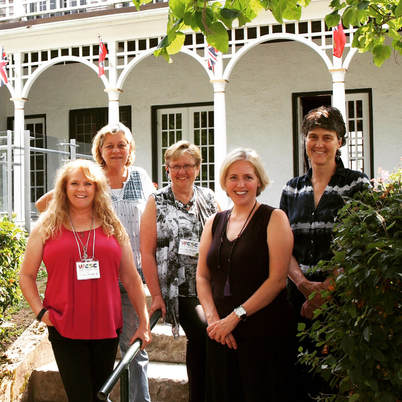Every author has some kind of advice or a unique learning experience for you to learn from, because each writer takes a different pathway to finding success.
Author Kate Hilton visits The Leacock Museum in Orillia.
Today, we talked about the Four Marketing Essentials for Authors, however these are just guidelines and are by no means the only way to go. They are suggestions that actually helped this author and a few of her friends, so let's take a look at them:
- Marketing is a MUST. Every writer needs to market themselves. You need to be able to talk about what you do. You need to explain in a clear and concise way, what is your book about? If you can't explain it in two or three sentences, you may want to work on that.
- Writers trying to promote themselves in 2017 need some kind of social media presence, even if it is only one or two things, for example: Website, Instagram, Twitter, Facebook etc. If someone googles your name, they should find something on the internet about you (hopefully it is a good thing, and not that you were arrested last week).
- Network with people. You need to build your audience from the kind of people who will be interested in reading your work, now and in the future.
- Setting priorities is difficult, but to succeed, you need to stick to your goals, otherwise you fall into a deep dark hole that will suck your time, energy and money. Social media can eat up your writing time, so you need separate social media time. The "Opportunity Cost" is: Time + Money + Effort = Value. If you spend more time socializing instead of writing your novel, your novel will be a work in progress for a very long time. Only YOU can change this.
- Less time on freebies and volunteering, and more time on your writing project.
- Figure out the best time you are creative. If your words flow faster at 4am, then haul your butt out of bed and get the words in then. You will need to allocate your time differently to take advantage of your best writing times.
- Never spend more money on promoting yourself than you will get out of it. Figure out what you can afford, decide if it is money worth spending and determine the difference between smart spending and stupid spending.
- Never self-edit, as you will never catch all the mistakes. Hire this out to another set of eyes. Paying for a professional edit before you submit to an agent, is money worth spending.
- Networking is marketing. Making human connections (listening as opposed to talking) is key to success. Sometimes, your lightning strike may come from several different connections.
- Sometimes it takes up to seven meaningful contacts or touches before someone will consider supporting you or buying your book. Be nice. Help others. Spread the word if you like a book. Write a review. Give a book as a gift.
- Always embrace your cheerleaders. They are the people who feel they have helped you or invested time in helping you succeed. They will tell two friends about you and your book, and then those people tell two friends, and so on, down the line so that word-of-mouth is still the best way to sell books. Recommendations from other people they trust.
- Marketing is all about branding. Tweet and post about things you are interested in, not about your personal struggles, your kids, your divorce, or anything you want to stay private.
- Find two or three things you are passionate about. Talk about these things. These are interests that you can talk about at a cocktail party with strangers, friends or family.
- My example: I love reading books, writing books and helping promote other authors. I love eating cake, pie and pretty much every dessert anyone could ever offer me. I also like sports and murder. These are the things I like to talk about on social media and at cocktail parties (maybe, I keep some of it on the down-low though, I don't really need the police and FBI keeping a close eye on all the cake I'm eating).
The Optional Workshop:
Who? What? Where? When? Why? How?
I don't need to go into the outlining process, as there are many books on that subject available to the public. However, many of our beginner writers loved this session. Kate gave many outlining examples for various genres. She drew diagrams and charts to help the visual learners. She discussed the three-act structure and all the math that goes with writing (how many words in each act, etc.). She mentioned the importance of character arcs, especially if you are trying to write a series of novels that link together.
Bottom line, Sunday was a great day for everyone - beginning to advanced writers - as there is always something you can learn out of listening to an author talk about their experiences with becoming a success.
The next WCSC (Writers' of Simcoe County) meeting is on Sunday, October 15th with Anna Mackay-Smith, Creative Coach, Actor, and Director. For more information or to register for the event, go HERE.

 RSS Feed
RSS Feed